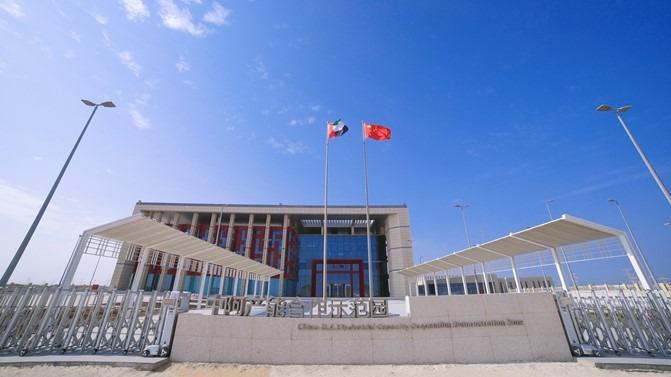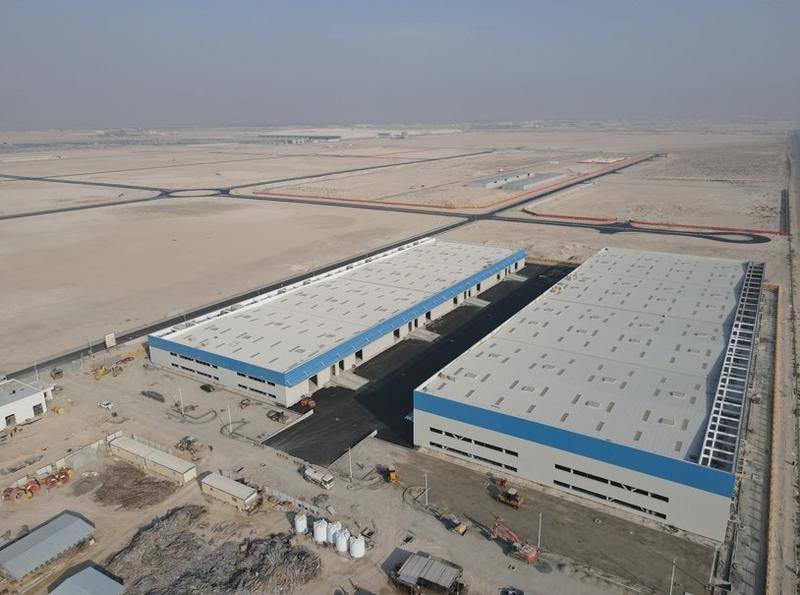 Located in the Khalifa Industrial Zone in Abu Dhabi, the China-UAE Industrial Capacity Cooperation Demonstration Zone is an important project between China and the UAE under the Belt and Road Initiative. (PHOTO PROVIDED TO CHINA DAILY)
Located in the Khalifa Industrial Zone in Abu Dhabi, the China-UAE Industrial Capacity Cooperation Demonstration Zone is an important project between China and the UAE under the Belt and Road Initiative. (PHOTO PROVIDED TO CHINA DAILY)
Progress on an industrial zone in Abu Dhabi despite disruptions caused by the COVID-19 pandemic shows that cooperation between China and the United Arab Emirates has struck deep roots, experts say.
Xiong Jun, executive deputy general manager of the China-UAE Industrial Capacity Cooperation Demonstration Zone, or ICCDZ, said work on the zone continued throughout the pandemic and that the project is being implemented on schedule. He said the construction of roads and utility pipeline network, manufacturing units of 29,000 square meters, a workers’ residential city of 40,000 sq m in phase one, and the administration and service center, the main office building of the zone, have been completed.
Since 2019, the ICCDZ – located in the Khalifa Industrial Zone in Abu Dhabi – has attracted total investment of over 3.2 billion yuan ($505 million).
"Over the past three years … the ICCDZ has signed land leasing agreements with 7 companies and factory leasing agreements with 5 companies, representing over 30 percent of usable land within the zone," said Xiong.
The ICCDZ is an important cooperation project between China and the UAE under the Belt and Road Initiative. The agreement for the development of the zone was signed in December 2015 during a meeting between Chinese President Xi Jinping and Abu Dhabi Crown Prince Sheikh Mohammed bin Zayed Al Nahya.
Construction began in May 2018 in two phases, with the first phase covering an area of 2.2 square kilometers and the second phase taking up 10 sq km.
Since the pandemic, the financial and time costs of traveling between China and UAE have increased drastically. As a result, the number of business groups visiting our zone has taken a nosedive.
Xiong Jun, Executive Deputy General Manager, ICCDZ
With an initial investment of 750 million yuan, infrastructure for the first phase will be completed by the end of this month, Xiong said.
During the Expo 2020 Dubai convention in October, the ICCDZ signed a number of cooperation agreements, including a memorandum of understanding with the UAE University's College of Business and Economics, a framework agreement for the "China-UAE Industrial Capacity Cooperation Demonstration Zone – Zheng He Vocational Education and Training Center" with Jiangsu Provincial Department of Education, as well as investment agreements with the ICCDZ's new tenants.
Speaking at a promotional event for the ICCDZ, UAE Ambassador to China Ali Al Dhaheri said economic and trade ties between the UAE and China have become increasingly close since diplomatic relations were established in 1984, and that he expects the two sides to build on the success of the ICCDZ to set up more cooperation demonstration projects.
Zhang Shiyuan, chairman of Runtai New Material Co in Jiangsu province, told China Daily that the company has overcome many challenges to ensure the implementation of its project in the ICCDZ, with construction expected to begin in early 2022.
"The Middle East region accounts for nearly one-third of our total sales overseas," said Zhang. "Setting up a factory in the Middle East not only helps save costs in raw material procurement and transport, but also allows us to enjoy various tax exemption policies in the ICCDZ."
With an investment of 500 million yuan for its subsidiary Runtai Chemical Industry Co, Runtai New Material was one of the first companies to invest in the ICCDZ. It was also the company’s first overseas factory.
Noting that the factory is expected to generate 1 billion yuan per year in production value, Zhang said he believes his company will help fill the UAE's gap in the coatings sector and support the country's economic development.
But the challenge brought by the pandemic remains huge, especially when it comes to attracting new investment, said ICCDZ's Xiong.
"Since the pandemic, the financial and time costs of traveling between China and UAE have increased drastically. As a result, the number of business groups visiting our zone has taken a nosedive," said Xiong, adding that more Chinese companies have now focused on domestic business and even suspended overseas investment due to the prolonged pandemic.
To adapt to the changing environment, Xiong said the zone now focuses on promoting cooperation in petroleum equipment, biopharmaceuticals and smart agriculture.
The selected industries were also based on the new demands for UAE's industrial development, Xiong said, noting that the Arab country has placed great emphasis on developing the industrial sector, especially advanced industries.
In March, the UAE launched a new industrial strategy dubbed "Operation 300bn", which aims to increase the contribution of the industrial sector from the current 133 billion UAE dirham ($36.21 billion) to 300 billion dirham over the next decade. In 2019, the country also approved the UAE Policy for Advanced Industries to promote the application of the fourth industrial revolution across all sectors.
Xiong said the anti-pandemic cooperation between China and the UAE laid a solid foundation for the ICCDZ to attract investment projects in healthcare, and that the enhanced mutual trust between the two countries will create a better business environment.
 The aerial photo shows the manufacturing units at the China-UAE Industrial Capacity Cooperation Demonstration Zone in Khalifa Industrial Zone, Abu Dhabi. (PHOTO PROVIDED TO CHINA DAILY)
The aerial photo shows the manufacturing units at the China-UAE Industrial Capacity Cooperation Demonstration Zone in Khalifa Industrial Zone, Abu Dhabi. (PHOTO PROVIDED TO CHINA DAILY)
The UAE was the first country after China to offer Chinese-developed COVID-19 vaccines to its citizens, kicking off the move in December 2020. It is also the first country to produce the Chinese Sinopharm vaccine overseas.
Chai Shaojin, assistant professor in the department of international relations at the University of Sharjah, said the ICCDZ is "a substantive project and right choice" by stakeholders from both sides.
While the project will export China's industrial capacity and experience to the Middle East, it will also help resource-rich countries like the UAE to achieve “leapfrog development” via fast upgrades of advanced industries, said Chai.
Noting that the UAE and other Gulf Cooperation Council states have launched a series of policies and strategies for economic diversification and industrialization, Chai said the countries are hungry for technology transfers and industrial upgrades from China.
"Chinese companies should seek this opportunity to jointly advance the Middle East's goal by allowing them to become part of the progress, not just as producers, manufacturers or traders, but partners and developers," said Chai.
He said sectors such as green production of petrochemicals, advanced logistics and healthcare equipment should be given greater priority in light of COVID-19 and climate change concerns.
In addition, Chai said education and training of skilled workers and professionals are also important.
Xiong from ICCDZ said he is confident about industrial capacity cooperation between China and the UAE after the pandemic, as the Arab nation will be more determined to develop its manufacturing industry.
"We will work to accelerate the investment projects in the zone so companies can begin operation as soon as possible," said Xiong, adding that the zone hopes to make positive contributions to the UAE's economic recovery and transformation through a localized strategy that meets the nation’s need.
Jan Yumul contributed to the story.
Contact the writer at kelly@chinadailyapac.com


